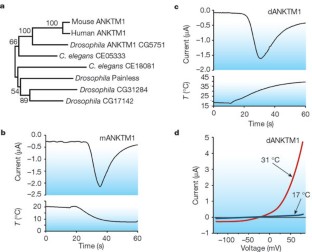Opposite thermosensor in fruitfly and mouse (original) (raw)
- Brief Communication
- Published: 19 June 2003
Ion channels
- Gina M. Story2,
- Andrea M. Peier1,
- Matt J. Petrus1,
- Van M. Lee1,
- Sun Wook Hwang2,
- Ardem Patapoutian1,2 &
- …
- Tim Jegla1
Nature volume 423, pages 822–823 (2003)Cite this article
- 2891 Accesses
- 3 Altmetric
- Metrics details
Abstract
Several members of the TRP (for transient receptor potential) family of ion channels act as physiological temperature sensors in mammals1,2,3,4,5,6, but it is not known whether the invertebrate TRP subfamilies that are found in the fruitfly Drosophila and the roundworm Caenorhabditis elegans can be directly activated by temperature. Here we show that the Drosophila orthologue of ANKTM1, which is a cold-activated ion channel in mammals, responds to a warming rather than a cooling stimulus. The thermosensing function of these channels is therefore evolutionarily conserved, and they show a surprising flexibility in their response to different temperature ranges.
This is a preview of subscription content, access via your institution
Access options
Subscribe to this journal
Receive 51 print issues and online access
$199.00 per year
only $3.90 per issue
Buy this article
- Purchase on SpringerLink
- Instant access to full article PDF
Prices may be subject to local taxes which are calculated during checkout
Additional access options:
Figure 1: Drosophila orthologue of the mammalian ion channel ANKTM1 is activated by warm, not cold, temperatures.

Similar content being viewed by others
References
- Caterina, M. J. & Julius, D. Annu. Rev. Neurosci. 24, 487–517 (2001).
Article CAS PubMed Google Scholar - Guler, A. D. et al. J. Neurosci. 22, 6408–6414 (2002).
Article CAS PubMed PubMed Central Google Scholar - Peier, A. M. et al. Science 296, 2046–2049 (2002).
Article ADS CAS PubMed Google Scholar - McKemy, D. D., Neuhausser, W. M. & Julius, D. Nature 416, 52–58 (2002).
Article ADS CAS PubMed Google Scholar - Peier, A. M. et al. Cell 108, 705–715 (2002).
Article CAS PubMed Google Scholar - Story, G. M. et al. Cell 112, 819–829 (2003).
Article CAS PubMed Google Scholar - Sayeed, O. & Benzer, S. Proc. Natl Acad. Sci. USA 93, 6079–6084 (1996).
Article ADS CAS PubMed PubMed Central Google Scholar - Liu, L., Yermolaieva, O., Johnson, W. A., Abboud, F. M. & Welsh, M. J. Nature Neurosci. 6, 267–273 (2003).
Article CAS PubMed Google Scholar - Tobin, D. et al. Neuron 35, 307–318 (2002).
Article CAS PubMed Google Scholar - Tracey, W. D., Wilson, R. I., Laurent, G. & Benzer, S. Cell 113, 261–273 (2003).
Article CAS PubMed Google Scholar - Walker, R. G., Willingham, A. T. & Zuker, C. S. Science 287, 2229–2234 (2000).
Article ADS CAS PubMed Google Scholar
Author information
Authors and Affiliations
- Genomics Institute of the Novartis Research Foundation, San Diego, 92121, California, USA
Veena Viswanath, Andrea M. Peier, Matt J. Petrus, Van M. Lee, Ardem Patapoutian & Tim Jegla - Department of Cell Biology, The Scripps Research Institute, La Jolla, 92037, California, USA
Gina M. Story, Sun Wook Hwang & Ardem Patapoutian
Authors
- Veena Viswanath
You can also search for this author inPubMed Google Scholar - Gina M. Story
You can also search for this author inPubMed Google Scholar - Andrea M. Peier
You can also search for this author inPubMed Google Scholar - Matt J. Petrus
You can also search for this author inPubMed Google Scholar - Van M. Lee
You can also search for this author inPubMed Google Scholar - Sun Wook Hwang
You can also search for this author inPubMed Google Scholar - Ardem Patapoutian
You can also search for this author inPubMed Google Scholar - Tim Jegla
You can also search for this author inPubMed Google Scholar
Corresponding author
Correspondence toArdem Patapoutian.
Ethics declarations
Competing interests
The authors declare no competing financial interests.
Rights and permissions
About this article
Cite this article
Viswanath, V., Story, G., Peier, A. et al. Opposite thermosensor in fruitfly and mouse.Nature 423, 822–823 (2003). https://doi.org/10.1038/423822a
- Published: 19 June 2003
- Issue Date: 19 June 2003
- DOI: https://doi.org/10.1038/423822a